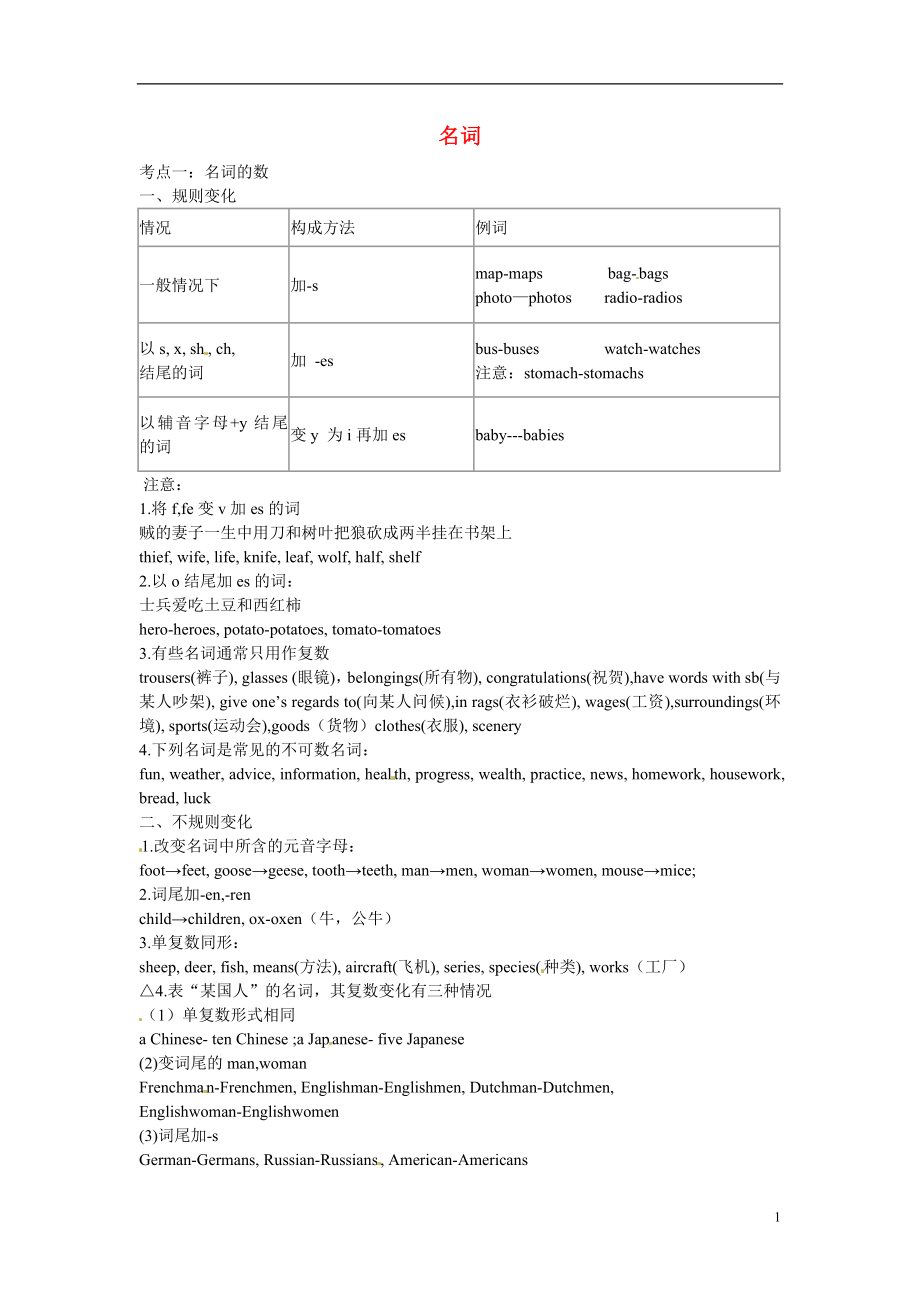《河北省撫寧縣第六中學(xué)2013-2014學(xué)年高二英語(yǔ) 名詞學(xué)案3》由會(huì)員分享���,可在線閱讀�,更多相關(guān)《河北省撫寧縣第六中學(xué)2013-2014學(xué)年高二英語(yǔ) 名詞學(xué)案3(2頁(yè)珍藏版)》請(qǐng)?jiān)谘b配圖網(wǎng)上搜索����。
1、
名詞
考點(diǎn)一:名詞的數(shù)
一�、規(guī)則變化
情況
構(gòu)成方法
例詞
一般情況下
加-s
map-maps bag-bags
photo—photos radio-radios
以s, x, sh, ch,
結(jié)尾的詞
加 -es
bus-buses watch-watches
注意:stomach-stomachs?
以輔音字母+y結(jié)尾的詞
變y 為i再加es
baby---babies
?注意:
1.將?f,fe變v加es的詞
賊的妻子一生中用刀和樹(shù)葉把狼砍成兩半掛在書(shū)架上
thief, wife, life, knife
2、, leaf, wolf, half, shelf
2.以o結(jié)尾加es的詞:
士兵愛(ài)吃土豆和西紅柿
hero-heroes, potato-potatoes, tomato-tomatoes
3.有些名詞通常只用作復(fù)數(shù)
trousers(褲子), glasses (眼鏡),belongings(所有物), congratulations(祝賀),have words with sb(與某人吵架), give one’s regards to(向某人問(wèn)候),in rags(衣衫破爛), wages(工資),surroundings(環(huán)境), sports(運(yùn)動(dòng)會(huì)),goods(貨物)c
3�、lothes(衣服), scenery
4.下列名詞是常見(jiàn)的不可數(shù)名詞:
fun, weather, advice, information, health, progress, wealth, practice, news, homework, housework, bread, luck
二、不規(guī)則變化
1.改變名詞中所含的元音字母:
foot→feet, goose→geese, tooth→teeth, man→men, woman→women, mouse→mice;
2.詞尾加-en,-ren
child→children, ox-oxen(牛����,公牛)
3.單復(fù)數(shù)同
4、形:
sheep, deer, fish, means(方法), aircraft(飛機(jī)), series, species(種類), works(工廠)
△4.表“某國(guó)人”的名詞���,其復(fù)數(shù)變化有三種情況
(1)單復(fù)數(shù)形式相同
a Chinese- ten Chinese ;a Japanese- five Japanese
(2)變?cè)~尾的man,woman
Frenchman-Frenchmen, Englishman-Englishmen, Dutchman-Dutchmen,
Englishwoman-Englishwomen
(3)詞尾加-s
German-Germa
5�����、ns, Russian-Russians, American-Americans
5.集體名詞的數(shù)
(1)有些集體名詞以單數(shù)形式出現(xiàn)��,但實(shí)為復(fù)數(shù)��。
如:people����,police�,cattle,不能說(shuō) a people�����,a police,a cattle�����,但可以說(shuō)a person�,a policeman����,a head of cattle,2 head of cattle;
(2) the English����,the British,the French��,the Chinese�,the Japanese,the Swiss 等名詞��,表示國(guó)民總稱時(shí)�,作復(fù)數(shù)用。
(3)有些集體名詞只用作單數(shù)
6�����、
luggage,baggage,equipment,clothing,poetry,machinery,furniture,mankind,jewellery
(4)有些集體名詞既可用作單數(shù),又可用作復(fù)數(shù)�。單數(shù)看作整體,復(fù)數(shù)看作集體的各個(gè)成員���。
family, class, team, group, public, crowd, government, company, club, party, population, couple等����。
eg: Our class is made up of 60 students.
Our class are excited hearing
7�����、 the news.
6.漢語(yǔ)音譯詞無(wú)復(fù)數(shù)
yuan, jiao, fen, jin, liang, mu eg: one yuan two yuan
7.專有名詞��,直接加s變復(fù)數(shù):
?? 如:two Marys the Henrys
三�、合成詞的復(fù)數(shù)
1.有主體名詞的將主體名詞變復(fù)數(shù)
mothers-in-law(岳母), editors-in-chief(主編)�����, lookers-on(旁觀者),passers-by(過(guò)路人)
2.無(wú)主體名詞構(gòu)成的合成詞����,在詞尾加-s eg: grown-ups
3.某些由man,woman構(gòu)成的合成詞��,兩部分都要變作復(fù)數(shù):
a man student—men students a woman doctor—women doctors
2
 河北省撫寧縣第六中學(xué)2013-2014學(xué)年高二英語(yǔ) 名詞學(xué)案3
河北省撫寧縣第六中學(xué)2013-2014學(xué)年高二英語(yǔ) 名詞學(xué)案3

